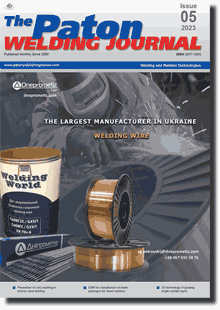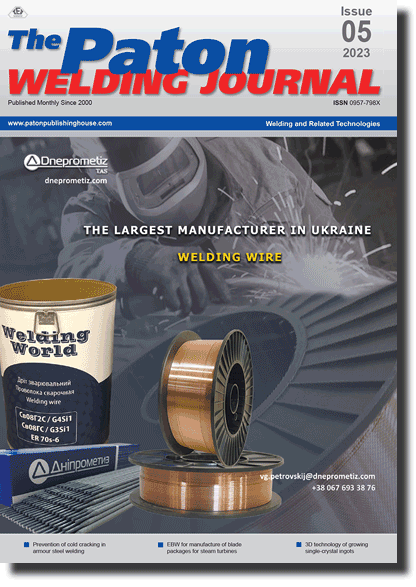| 2023 №05 (08) |
DOI of Article 10.37434/tpwj2023.05.01 |
2023 №05 (02) |

The Paton Welding Journal, 2023, #5, 3-10 pages
Prevention of cold cracking in armour steel welding
O.A. Gaivoronskyi, V.D. Poznyakov, A.V. Zavdoveyev, A.V. Klapatyuk, A.M. Denisenko
E.O. Paton Electric Welding Institute of the NASU. 11 Kazymyr Malevych Str., 03150, Kyiv, Ukraine. E-mail: paton39@ukr.netAbstract
The work presents the results of investigations of cold cracking susceptibility of welded joints on modern high hardness armour steels and gives recommendations on their prevention. Calculations were performed using a calculation method according to EN 1011-2:2001 – the Implant method to determine the delayed fracture resistance of the HAZ metal and rigid technological test in welding multilayer joints. It is found that in arc welding, the joints of high hardness armour steels have a higher cold cracking susceptibility in the HAZ metal. In welding with low-alloyed material of Sv-10GSMT type application of preheating allows avoiding them. The preheating temperature can be calculated by CET and TE indices in keeping with the armour steel composition. In the presence of steel raisers in the welded joints the calculated preheating temperature should be increased by 50 – 70 °C. The welded joints made with high-alloyed material of Sv-08Kh20N9G7T type have higher delayed fracture and cold cracking resistance. In manufacture of light armoured vehicles, it is recommended to select armour steel with carbon content of not more than 0.26 % C. In welding such armour steel by low-alloyed materials sufficiently high cold cracking resistance of welded joints is ensured, even in the presence of stress raisers, due to preheating up to the temperature of 150 °C, as well as in welding without preheating at application of high-alloyed materials. 13 Ref., 4 Tabl., 7 Fig.
Keywords: armour steel, high hardness steel, arc welding, welded joints, HAZ metal, cold cracks
Received: 25.04.2023
Accepted: 29.06.2023
References
1. Makarov, E.L. (1981) Cold cracks in welding of alloyed steels. Moscow, Mashinostroenie [in Russian].2. Efimenko, M.G., Radzivilova, N.O. (2003) Physical metallurgy and heat treatment of welded joints. Kharkiv, Kharkivska Drukarnya No. 16 [in Ukrainian].
3. Skulsky, V.Yu. (2009) Peculiarities of kinetics of delayed fracture of welded joints of hardening steels. The Paton Welding J., 7, 12-17.
4. Günen, A., Bayar, S., Karakaş, M.S. (2020) Effect of different arc welding processes on the metallurgical and mechanical properties of Ramor 500 armor steel. J. of Engineering Materials and Technology, 142, 2. https://doi.org/10.1115/1.4045569
5. Pokhodnya, I.K., Shvachko, I.V. (1997) Physical nature of hydrogen induced cold cracks in welded joints of structural steels. Avtomatich. Svarka, 5, 3-12 [in Russian].
6. Gajvoronsky, A.A. (2013) Influence of diffusible hydrogen on delayed cracking resistance of high-carbon steel welded joints. The Paton Welding J., 5, 14-20.
7. Magudeeswaran, G., Balasubramanian, V., Reddy, G.M. (2008) Hydrogen induced cold cracking studies on armour grade high strength, quenched and tempered steel weldments. Int. J. of hydrogen energy, 33(7), 1897-1908. https://doi.org/10.1016/j.ijhydene.2008.01.035
8. EN 1011-2:2001. Recommendations for welding of metallic materials.
9. Suzuki, Н. (1980) Cold Cracking and its Prevention in Steel Welding (III). DОС IIW IX-1157-80.
10. Magudeeswaran, G., Balasubramanian, V., Madhusudhan Reddy, G. (2008) Effect of welding consumables on hydrogen induced cracking of armour grade quenched and tempered steel welds. Ironmaking & Steelmaking, 33(7), 549-560. https://doi.org/10.1179/174328108X335104
11. V.D. Poznyakov, V.D. Shelyagin, S.L. Zhdanov, A.A. Maksimenko, A.V. Zavdoveev And A.V. Bernatsky (2015) Laser-arc welding of high-strength steels with yield strength of more than 700 MPa. The Paton Welding J., 10, 19-24. https://doi.org/10.15407/tpwj2015.10.03
12. O.A. Gaivoronskyi, V.D. Poznyakov, O.M. Berdnikova, T.O. Alekseenko and O.S. Shyshkevych (2020) Influence of low-temperature tempering on structure and properties of welded joints of high-strength steel 30Kh2N2MF. The Paton Welding J., 6, 20-26. https://doi.org/10.37434/tpwj2020.06.04
13. Magudeeswaran, G., Balasubramanian, V., Reddy, G.M. (2018) Metallurgical characteristics of armour steel welded joints used for combat vehicle construction. Defence Technology, 14(5), 590-606. https://doi.org/10.1016/j.dt.2018.07.021
Suggested Citation
O.A. Gaivoronskyi, V.D. Poznyakov, A.V. Zavdoveyev, A.V. Klapatyuk, A.M. Denisenko (2023) Prevention of cold cracking in armour steel welding. The Paton Welding J., 05, 3-10.The cost of subscription/purchase order journals or individual articles
| Journal/Currency | Annual Set | 1 issue printed |
1 issue |
one article |
| TPWJ/USD | 384 $ | 32 $ | 26 $ | 13 $ |
| TPWJ/EUR | 348 € | 29 € | 24 € | 12 € |
| TPWJ/UAH | 7200 UAH | 600 UAH | 600 UAH | 280 UAH |
| AS/UAH | 1800 UAH | 300 UAH | 300 UAH | 150 UAH |
| AS/USD | 192 $ | 32 $ | 26 $ | 13 $ |
| AS/EUR | 180 € | 30 € | 25 € | 12 € |
| SEM/UAH | 1200 UAH | 300 UAH | 300 UAH | 150 UAH |
| SEM/USD | 128 $ | 32 $ | 26 $ | 13 $ |
| SEM/EUR | 120 € | 30 € | 25 € | 12 € |
| TDNK/UAH | 1200 UAH | 300 UAH | 300 UAH | 150 UAH |
| TDNK/USD | 128 $ | 32 $ | 26 $ | 13 $ |
| TDNK/EUR | 120 € | 30 € | 25 € | 15 € |
AS = «Automatic Welding» - 6 issues per year;
TPWJ = «PATON WELDING JOURNAL» - 12 issues per year;
SEM = «Electrometallurgy Today» - 4 issues per year;
TDNK = «Technical Diagnostics and Non-Destructive Testing» - 4 issues per year.


